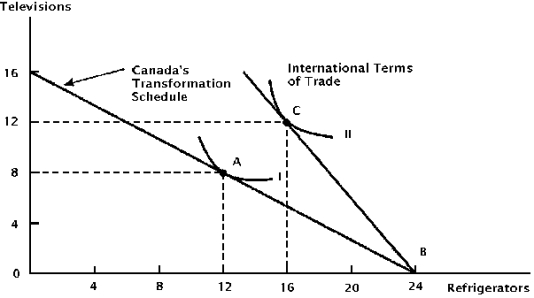Exam 2: Foundations of Modern Trade Theory: Comparative Advantage
Exam 1: the International Economy and Globalization48 Questions
Exam 2: Foundations of Modern Trade Theory: Comparative Advantage166 Questions
Exam 3: Sources of Comparative Advantage106 Questions
Exam 4: Tariffs118 Questions
Exam 5: Nontariff Trade Barriers130 Questions
Exam 6: Trade Regulations and Industrial Policies124 Questions
Exam 7: Trade Policies for the Developing Nations98 Questions
Exam 8: Regional Trading Arrangements129 Questions
Exam 9: International Factor Movements and Multinational Enterprises93 Questions
Exam 10: the Balance of Payments99 Questions
Exam 11: Foreign Exchange120 Questions
Exam 12: Exchange-rate Determination129 Questions
Exam 13: Balance-of-payments Adjustments107 Questions
Exam 14: Exchange-rate Adjustments and the Balance of Payments96 Questions
Exam 15: Exchange-rate Systems and Currency Crises105 Questions
Exam 16: Macroeconomic Policy in an Open Economy72 Questions
Exam 17: International Banking: Reserves, debt, and Risk93 Questions
Select questions type
Table 2.1. Output Possibilities of the U.S. and the U.K.
 -Referring to Table 2.1,the United Kingdom gains most from trade if:
-Referring to Table 2.1,the United Kingdom gains most from trade if:
(Multiple Choice)
4.7/5  (37)
(37)
For the commodity terms of trade to improve,a country's export price index must rise relative to its import price index over a given time period.
(True/False)
4.8/5  (43)
(43)
MacDougall's empirical study of comparative advantage was based on the notion that a product's labor cost is underlaid by labor productivity and the wage rate.
(True/False)
4.8/5  (44)
(44)
A nation achieves autarky equilibrium at the point where its community indifference curve is tangent to its production possibilities schedule.
(True/False)
4.8/5  (34)
(34)
The use of indifference curves helps us determine the point:
(Multiple Choice)
4.9/5  (41)
(41)
The Ricardian model of comparative advantage is based on all of the following assumptions except:
(Multiple Choice)
4.8/5  (38)
(38)
Introducing indifference curves into our trade model permits us to determine:
(Multiple Choice)
4.9/5  (44)
(44)
According to the price-specie-flow-doctrine,a trade-surplus nation would experience gold outflows,a decrease in its money supply,and a fall in its price level.
(True/False)
4.9/5  (33)
(33)
It is possible for a nation not to have an absolute advantage in anything; but it is not possible for one nation to have a comparative advantage in everything and the other nation to have a comparative advantage in nothing.
(True/False)
4.8/5  (39)
(39)
Assume 1990 to be the base year.If by the end of 2004 a country's export price index rose from 100 to 125 while its import price index rose from 100 to 125,its terms of trade would equal 100.
(True/False)
4.8/5  (36)
(36)
Mutually beneficial trade for two countries occurs if the equilibrium terms of trade lies between the two countries' domestic cost ratios.
(True/False)
4.8/5  (37)
(37)
According to Ricardo,a country will have a comparative advantage in the product in which its:
(Multiple Choice)
4.9/5  (50)
(50)
Assume that Canada has a comparative advantage in wheat and a comparative disadvantage in autos.As the Canadian demand for wheat increases,Canada's equilibrium terms of trade improves.
(True/False)
4.8/5  (37)
(37)
A terms-of-trade index that equals 150 indicates that compared to the base year:
(Multiple Choice)
4.9/5  (38)
(38)
According to Adam Smith,international trade was a "win-win" situation since all nations could enjoy gains from trade.
(True/False)
4.8/5  (35)
(35)
The mercantilists maintained that a free-trade policy best enhances a nation's welfare.
(True/False)
4.9/5  (26)
(26)
Figure 2.2 illustrates trade data for Canada. The figure assumes that Canada attains international trade equilibrium at point C.
Figure 2.2. Canadian Trade Possibilities
 -According to Figure 2.2,exports for Canada total:
-According to Figure 2.2,exports for Canada total:
(Multiple Choice)
5.0/5  (39)
(39)
Table 2.2. Output possibilities for South Korea and Japan
 -Refer to Table 2.2.With international trade,what would be the maximum amount of steel that South Korea would be willing to export to Japan in exchange for each VCR?
-Refer to Table 2.2.With international trade,what would be the maximum amount of steel that South Korea would be willing to export to Japan in exchange for each VCR?
(Multiple Choice)
4.7/5  (31)
(31)
Showing 21 - 40 of 166
Filters
- Essay(0)
- Multiple Choice(0)
- Short Answer(0)
- True False(0)
- Matching(0)